Penny’s Malasadas comes to PCC
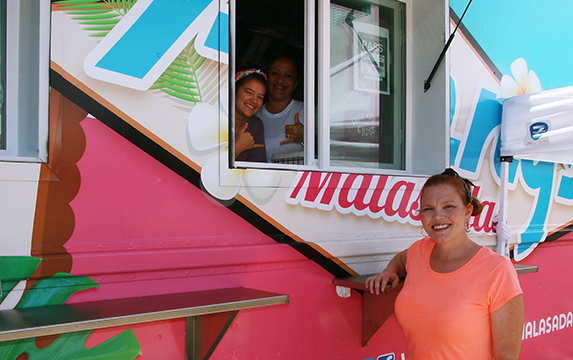
Pictured are Aubrey Warner (right) and her friendly staff from Penny’s Malasadas newest food truck at the Polynesian Cultural Center’s Hukilau Marketplace in Laie, Hawaii. (PCC photos by Mike Foley)
With the opening of the brightly colored Penny’s Malasadas’ food truck on the Hauula side of the Polynesian Cultural Center’s parking lot, Portuguese-style malasadas are now regularly available in Laie. Previously, North Shore Oahu people could only purchase them nearby on special occasions.
The history of malasadas in Hawaii
For the uninitiated, a malasada is a doughy, round, deep-fried confection which is usually either eaten hot and plain right out of the fryer, or hot and rolled in granulated sugar and then devoured. A more modern version calls for injecting them with various flavored fillings. However they like them, fans of this tasty treat think malasadas are better than doughnuts.
When significant numbers of Portuguese laborers started migrating to Hawaii in 1878, they brought musical instruments that would soon-enough morph into the Hawaiian ukulele. They also brought a type of Portuguese “doughnut,” which they call malasadas. The former is now famous around the world, the latter is a popular treat here and in other places where Portuguese culture has made an impact.
The early Portuguese in these islands prepared malasadas, which literally means “under or poorly cooked,” during Mardi Gras to use up fats and sugary ingredients in time for Lent.
Friendly ties to the PCC
Penny’s offers the traditional plain and sugared malasadas, “and then every day, we also prepare at least three different filling options: We try to keep coconut and chocolate on the menu every day, because everybody loves them; and we alternate among key lime, pineapple, lemon, guava, raspberry and other flavored fillings. Those flavors will change every week.”
Owners Aubrey Warner and her husband, Andy Slikker, recently moved here from Utah, where they operated several food-related businesses, to open Penny’s. She explained that Andy grew up in Santa Barbara, California, “which is kind of a Portuguese hub. His mom and dad ran bakeries there, and he grew up with malasadas as a child.”
She and Andy came to PCC last fall to visit Felix Tai, executive chef of Pounders Restaurant in the Hukilau Marketplace. “He’d also been the executive chef for another company that Andy and I owned in Utah, and that’s how we knew him.”
“While we were here, Greg Maples, the marketplace’s general manager, casually asked if Andy knew how to make malasadas. It just kind of snowballed from there, and here we are. We’re excited to be part of the PCC ‘ohana [family] and community.”
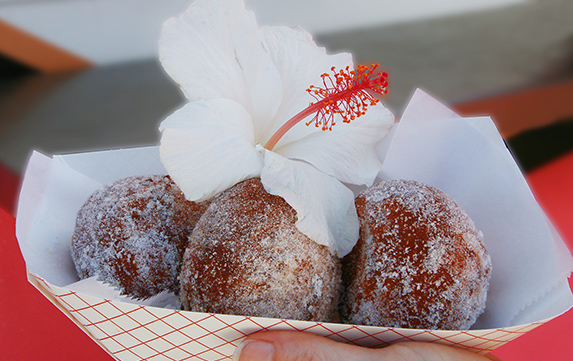
Sugared Malasadas from Penny’s at PCC’s Hukilau Marketplace.
The ‘tidal wave’ of malasadas
“And then we’ve created our tsunami, that’s been selling like crazy. It’s actually a hot malasada topped off with local mango slices and strawberries, that somebody grows down the road, plus ice cream, whipped cream and a passion fruit glaze all on top.”
Doing malasadas right
Aubrey said it took a few days to adjust their malasadas because “the yeasty dough has to be just right, and conditions here change every day: the temperature and humidity affect how it rises. We prepare the dough in our own kitchen here.”
She also said, “We’re really trying to buy our ingredients from the local vendors and give back to the community. In the future we may also add fundraisers and sponsorships.”
When asked if she feels like Penny’s is in competition with that other well-known local malasada bakery in Honolulu, Aubrey replied, “Now that I understand how difficult it is to transport malasada dough, I feel like we’ve got the North Shore covered. Several of our customers have also told us we are at least as good, and a lot better than them.”
“I feel like we’re doing it right,” Aubrey said, “and hope people will come give our malasadas a try.” She added that Penny’s offers student and kamaaina discounts.
Hungry for an onolicious Mexican-style menu?
The next time you’re in the Polynesian Cultural Center’s Hukilau Marketplace, stop by the Guadalajara Grill run by the Padilla brothers, Gio and Javier, plus Gio’s wife, Lizette — who all have ties to Mexico. The PCC recently invited them to add their colorful food truck and pleasant eating area to the marketplace’s food court.
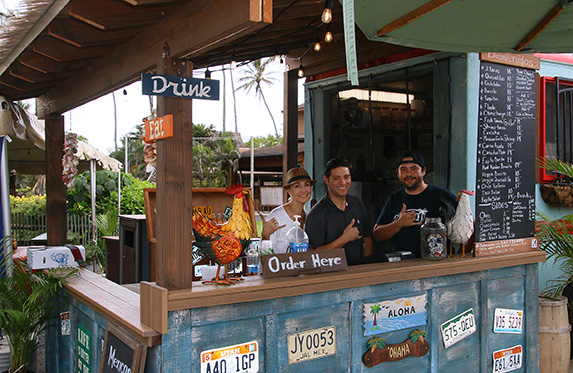
Lizette, Gio and Javier Padilla (pictured left to right) at the new Guadalajara Grill food truck in the Polynesian Cultural Center’s Hukilau Marketplace.
Gio took a break from overseeing their compact kitchen to point out the food truck offers tacos, of course — with grilled steak, ground beef, or chicken and they also serve…
A delicious range of other Mexican specialties
Guadalajara Grill also offers enchiladas, quesadillas, burritos, flautas, taquitos, garlic shrimp, chipotle shrimp, and ceviche. They also serve grilled fish tacos, one of their most popular dishes, which is especially common along Mexico’s Pacific coast, “where they have a lot of seafood which they often cook in batter, but we grill ours.” Most orders come with Spanish rice and refried beans.
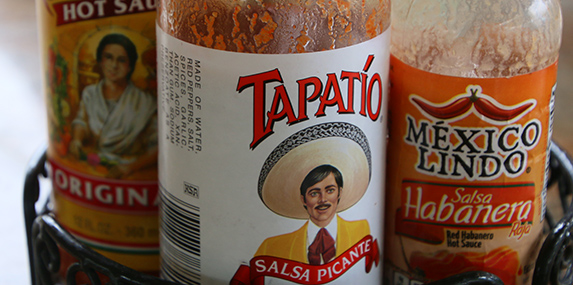
Taco sauce selection at the new Guadalajara Grill food truck.
Then there’s the top-of-the-line Red Raider Burrito — named for nearby Kahuku High championship teams — which includes grilled steak and chicken, rice, beans, lettuce, pico, cheese, guacamole, sour cream, and a salad on the side. “It’s the largest one we serve,” Gio said.
Gio and his wife have loved the Polynesian Cultural Center since their first visit about 16 years ago. At that time they took a photo with PCC’s popular cultural ambassador, Kap Tafiti in the Samoan Village. “I still have that picture in our house in Mexico; and when I saw him at our grill as a customer, I couldn’t believe it. I told him, you’re like a celebrity to me.”
“We’re very happy with business as it is,” Gio said, “and I’ve been told this is a slower time of the year, so we imagine summer’s going to get even busier.”
Meet PCC popcorn entrepreneur Vili Toilolo
PCC alum Vili Toilolo recently opened Liv’s Snack Shack in the PCC’s Hukilau Marketplace, a small stand near the entrance to the Pacific Theater that sells fresh popcorn, candy and a few other yummy treats.
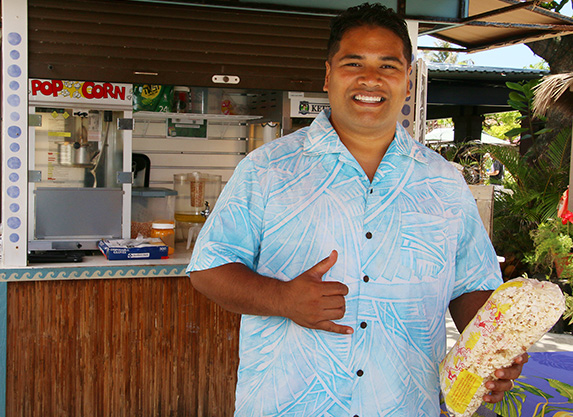
Vili Toilolo at his popcorn snack shop, Liv’s Snack Shack, at the Hukilau Marketplace.
“Buttered popcorn is our most popular item,” Vili says. “We also sell kettle corn, and add-ons like mochi crunch [a salty Japanese-style rice cracker], and li hing powder (a sweet-and-salty Chinese seasoning).” Hawaii kamaaina [local residents] often mix mochi crunch and li hing powder with their popcorn.
Not surprisingly, Vili says his stand is particularly busy “right before the night show. It’s funny how people can come from the buffet and still want fresh popcorn. They can always make room for this snack.”
Like thousands of other PCC alumni
Vili is a Samoan raised in Federal Way, Washington, until his family moved to Hawaii when he was in high school. He enrolled at BYU–Hawaii in 1995. Like thousands of young students before him, he soon got a job at the Polynesian Cultural Center as a dancer and later a retail salesperson. Like many other PCC alumni, he met his future wife, Penny — a Laie girl with multi-generational ties to the PCC. The couple’s ninth child is now on the way, and they named the popcorn business after one of their daughters.
After interrupting his studies to serve as a Cambodian-speaking Mormon missionary in Sacramento, California, Vili graduated in 2001 with a degree in international business management. Penny graduated the following year in the same field.
Vili praises Penny for all her support and also cites the example of his hard-working father, who earned a GED [high school equivalency] diploma later in life, and his mom. “They always told me to work smart,” he said.
PCC alumnus pursues his entrepreneurial spirit
So, where did the Toilolo’s business drive come from? “BYUH had an entrepreneurial lecture series once a month, and I loved it,” Vili replied. In fact, the couple has been starting up their own businesses for approximately the past decade. Penny, for example, operates her own successful Polynesian dance school, Te Hamata; and this past January Vili took a higher plunge when he quit his full time facilities management job of 16 years to focus on Liv’s Snack Shack and his other business interests.
“I love operating my business at the PCC,” he said. “The support is wonderful, and Hukilau Marketplace general manager Greg Maples is amazing. He has a passion for the success of small businesses here, and I like the aloha spirit he cultivates among all the vendors and guests.”
“Between this and my new lunch truck business,” which generally operates on the North Shore of Oahu, “they keep me pretty busy. I started my lunch truck about two weeks ago. It’s all hard work, but very rewarding.”
 Story and photos by Mike Foley, who has been a full-time freelance writer and digital media specialist since 2002. Prior to that, he had a long career in marketing communications, PR, journalism and university education. Foley learned to speak fluent Samoan as a Mormon missionary before moving to Laie in 1967 — and still does. He has traveled extensively over the years throughout Polynesia, other Pacific islands, and Asia. He is mostly retired now but continues to contribute to PCC and various other media.
Story and photos by Mike Foley, who has been a full-time freelance writer and digital media specialist since 2002. Prior to that, he had a long career in marketing communications, PR, journalism and university education. Foley learned to speak fluent Samoan as a Mormon missionary before moving to Laie in 1967 — and still does. He has traveled extensively over the years throughout Polynesia, other Pacific islands, and Asia. He is mostly retired now but continues to contribute to PCC and various other media.
Recent Comments